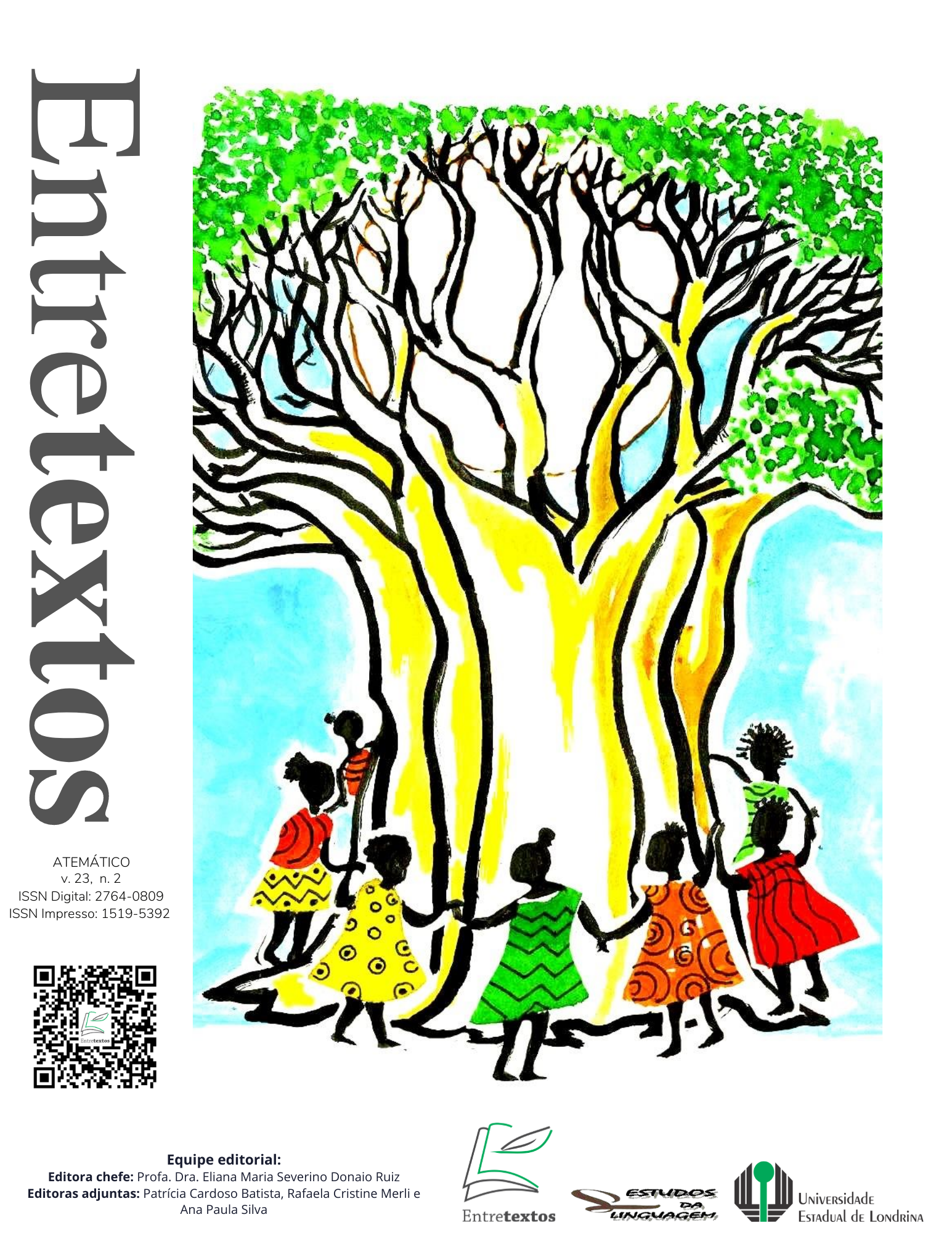Pensando e fazendo com o criancismo nos estudos da literatura infantil
DOI:
https://doi.org/10.5433/1519-5392.2023v23n2p335-363Palavras-chave:
crítica criancista, literatura e cultura infantil e juvenil, feminismo novo materialista, pesquisa participativa, pós-humanismoResumo
Neste artigo, compartilhamos reflexões sobre o modo como o criancismo nos permitiu navegar por pressupostos teóricos que moldam nosso campo e desenvolver novas posições e práticas de pesquisa que fomentam as interdependências entre crianças e adultos. Justyna Deszcz-Tryhubczak confiou no criancismo como uma estrutura para a introdução da pesquisa participativa com jovens leitores como forma de promover a colaboração criança-adulto. Já Macarena García-González utilizou o criancismo para pensar o adultismo e suas analogias com o sexismo. Embora elas ofereçamuma crítica ao criancismo como um conceito essencializante, também mostram como, ele serviu como uma porta de entrada para outras abordagens e, especialmente, para entendimentos pós-antropocêntricos tanto dos textos, leitores e mundo quanto dos nossos engajamentos críticos. Finalmente, argumentam que o criancismo pode continuar sendo um ponto de partida produtivo para novas aberturas na literatura infantil e juvenil, nos estudos da cultura e nos estudos da infância, se ele se tornar uma noção plural e "desordenada" que questiona o discurso de esperança por um futuro melhor como definidor da vida das crianças.
Downloads
Referências
BARAD, K. Meeting the universe halfway: Quantum physics and the entanglement of matter and meaning. Durham, N.C.: Duke University Press, 2007.
BEAUVAIS, C. The mighty child: Time and power in children's literature. Amsterdam/London: John Benjamins Publishing Company, 2015.
BEAUVAIS, C. Thinking the adult-child relationship with existentialism. In: SPYROU, S.; ROSEN, R.; e COOK D. T. (Eds.). Reimagining childhood studies. London: Bloomsbury Academic, 2018, p. 57-74.
BISWAS, T. Who needs sensory education? Studies in Philosophy and Education, v. 40, n. 3, 287-302, 2021.
CHAPLEAU, S. Childist criticism and the silenced voice of the child: A widening critical and institutional re-consideration of children's literature. In: FINDLAY R.; SALBAYRE, S. (Eds.). Stories for children, histories of childhood. Paris: Presses Universitaires François-Rabelais, 2007, p. 85-106. Disponivel em: http://books.openedition.org/pufr/4946
CHAPLEAU, S. Work in progress: Children's literature and childist criticism - towards an institutional re-consideration. (Tese de doutorado). Cardiff University, English, Communication and Philosophy, 20. Disponivel em: https://orca.cardiff.ac.uk/54518/
CHAWAR, E.; DESZCZ-TRYHUBCZAK, J.; KOWALSKA, K.; MANIAKOWSKA, O.; MARECKI, M.; PALCZYŃSKA, M.; PSZCZOÅOWSKI, E.; SIKORA, D. Children's voices in the polish canon wars: Participatory research in action. International Research in Children's Literature, v. 11, n. 2, p. 111-131, 2018.
COATS, K. S. Keepin'it plural: Children's studies in the academy. Children's Literature Association Quarterly, v. 26, n. 3, p. 140-150, 2001.
CONRAD, R. Time for childhoods: Young poets and questions of agency. Amherst, MA: University of Massachusetts Press, 2019.
CUMMING, P. E. What Children's writing? Read by whom, how, and to what ends? Canadian Children's Literature/Littérature canadienne pour la jeunesse, v. 34, n, 1, p. 106-115, 2008.
DESZCZ-TRYHUBCZAK, J. Thinking with deconstruction: Book-adult-child events in Children's literature research. Oxford Literary Review, v. 41, n. 2, p. 185-201, 2019.
DESZCZ-TRYHUBCZAK, J.; JAQUES, Z. Intergenerational solidarity in children's literature and film. Jackson, MS: University Press of Mississippi, 2021.
DESZCZ-TRYHUBCZAK, J.; KALLA, I. B. Rulers of literary playgrounds: Politics of intergenerational play in Children's literature. London/New York: Routledge, 2021a.
DESZCZ-TRYHUBCZAK, J.; KALLA, I. B. Children's literature and intergenerational relationships: Encounters of the playful kind. New York, N. Y.: Springer International Publishing, 2021b. Disponivel em: https://books.google.cl/books?id=gworEAAAQBAJ
DESZCZ-TRYHUBCZAK, J.; MARECKI, M. A meta-critical reflection on academic writing with child researchers. In SPENCER, G. (Ed.). Ethics and integrity in research with children and Young. Bingley, UK: Emerald Publishing Limited, 2021, p. 213-227.
DESZCZ-TRYHUBCZAK, J.; MARECKI, M.; CHAWAR, E.; KACZKOWSKA, M.; KOWALSKA, K.; KULAWIK, A.; OÅ»LAŃSKA, M.; PALCZYŃSKA, M.; PARCHENIAK, N.; PSZCZOÅOWSKI, E. Productive remembering of childhood: Child-Adult memory-work with the school literary canon. Humanities, v. 8, n. 2, 74, 2019. DOI: https://doi.org/10.3390/h8020074
DIAZ-DIAZ, C.; SEMENEC, P. Posthumanist and new materialist methodologies: Research after the child. New York, N. Y.: Springer International Publishing, 2020.
FELSKI, R. Literature after feminism. Chicago: University of Chicago Press, 2020.
GALBRAITH, M. Hear my cry: A manifesto for an emancipatory childhood studies approach to Children's literature. The Lion and the Unicorn, v. 25. n. 2, p.187-205, 2001. DOI: https://doi.org/10.1353/uni.2001.0019
GALLACHER, L. A.; GALLAGHER, M. Methodological immaturity in childhood research? Thinking through participatory methods. Childhood, v. 15, n. 4, p. 499-516, 2008.
GARCÍA-GONZÁLEZ, M.; DESZCZ-TRYHUBCZAK, J. New materialist openings to children's literature studies. International Research in Children's Literature, v. 13, n. 1, p. 45-60, 2020. DOI: https://doi.org/10.3366/ircl.2020.0327
GARCÍA-GONZÁLEZ, M.; DESZCZ-TRYHUBCZAK, J. Children's literature as a site of slow violence, 2021. Disponivel em: https://reimaginingchildhoodstudies.com/childrens-literature-as-a-site-of-slow-violence/
GUBAR, M. Artful dodgers: Reconceiving the golden age of children's literature. Oxford/New York: Oxford University Press, 2009.
GUBAR, M. The hermeneutics of recuperation: What a kinship-model approach to children's agency could do for children's literature and childhood studies. Jeunesse: Young people Texts, Cultures, v. 8, n.1, p. 291-310, 2016.
HARAWAY, D. The companion species manifesto: Dogs, people, and significant otherness. Chicago: Prickly Paradigm Press, 2003.
HARAWAY, D. When species meet. Minneapolis: University of Minnesota Press, 2008.
HUNT, P. Childist criticism: The subculture of the child, the book and the critic. Signal - Approaches to Children's Books, v. 43, p. 42-59, 1984.
HUNT, P. Criticism, theory, and children's literature. New Jersey: Blackwell Publishing, 1991.
JOOSEN, V. The adult as foe or friend?: Childism in Guus Kuijer's criticism and fiction. International Research in Children's Literature, v. 6, n. 2, p. 205-217, 2013. DOI: https://doi.org/10.3366/ircl.2013.0099
JOOSEN, V. Adulthood in children's literature. London/New York: Bloomsbury Academic, 2018.
JOOSEN, V. Connecting Childhood Studies, Age Studies, and Children's Literature Studies: John Wall's Concept of Childism and Anne Fine's The Granny Project. Barnboken, v. 45, n. 9 2022.
KRAFTL, P.; HORTON, J. Children's geographies and the "new wave" of childhood studies. In SPYROU, S.; ROSEN, R.; COOK, D. T. (Eds.). Reimagining childhood studies. London/New York: Bloomsbury Academic, 2018, p. 105-122.
LENZ TAGUCHI, H. Investigating learning, participation and becoming in early childhood practices with a relational materialist approach. Global Studies of Childhood, v. 1, n. 1, p. 36-50, 2011. DOI: https://doi.org/10.2304/gsch.2011.1.1.36
LESNIK-OBERSTEIN, K. Children's literature: Criticism and the fictional child. Oxford: Clarendon Press, 1994.
LESNIK-OBERSTEIN, K.; THOMSON, S. What is queer theory doing with the child? Parallax, vol. 8, no.1, p. 35-46, 2002.
MALONE, K.; TESAR, M.; ARNDT, S. Theorising posthuman childhood studies. New York, N. Y.: Springer International Publishing, 2020.
MAZZEI, L. A. A voice without organs: Interviewing in posthumanist research. International Journal of Qualitative Studies in Education, v. 26, n. 6, p. 732-740, 2013.
MAZZEI, L. A. Voice without a subject. Cultural Studies ↔ Critical Methodologies, v.16, n. 2, p. 151-161, 2016. DOI: https://doi.org/10.1177/1532708616636893
MELROSE, A. The hidden adult and the hiding child in writing for children?. Text Journal, v. 16, n. 1, 2012. DOI: http://www.textjournal.com.au/april12/melrose.htm
MURRIS, K. Posthuman child and the diffractive teacher: Decolonizing the nature/culture binary. In CUTTER-MACKENZIE-KNOWLES, A.; MALONE, K.; HACKING, E. B. (Eds.). Research handbook on childhoodnature: Assemblages of childhood and nature research. New York, N. Y.: Springer International Publishing, 2020, p. 31-55.
NANCE-CARROLL, N. Children and Young people as activist authors. International Research in Children's Literature, vol. 14, no. 1, p. 6-21, 2021. DOI: https://doi.org/10.3366/ircl.2021.0374
NIKOLAJEVA, M. Theory, post-theory, and aetonormative theory. Neohelicon, v. 36, n. 1, p. 13-24, 2009.
NIKOLAJEVA, M. Power, voice and subjectivity in literature for young readers. London/New York: Routledge, 2010.
NODELMAN, P. The hidden adult: Defining children's literature. Baltimore: John Hopkins University Press, 2008.
OSGOOD, J. Playing with gender: Making space for post-human childhood (s). In MOYLES, J.; PAYLER, J.; GEORGESON, J. (Eds.). Early years foundations: Critical issues. Oxford: Oxford University Press, 2014, p. 191-202.
OSGOOD, J.; ROBINSON, K. H. (Eds.). Feminists researching gendered childhoods: Generative entanglements. Londo: Bloomsbury Academic, 2019.
PAUL, L. Enigma variations: What feminist theory knows about children's literature. Signals, v. 54, n. 186, 1987.
PUNCH, S. Cross-world and cross-disciplinary dialogue: A more integrated, global approach to childhood studies. Global Studies of Childhood, v. 6, n.3, p. 352-364, 2016.
PUNCH, S. Why have generational orderings been marginalised in the social sciences including childhood studies? Children's Geographies, v. 18, n. 2, p. 128-140, 2020.
REYNOLDS, K. Child-oriented criticism. In GRENBY, M. O.; REYNOLDS, K. (Eds.). Children's literature studies: A research handbook. London: Palgrave Macmillan, 2011, p. 128-132.
ROSE, J. The case of Peter pan: Or the impossibility of Children's fiction. London: Palgrave Macmillan, 1984.
RUDD, D. Theorising and theories: How does children's literature exist? In Hunt, P. (Ed.). Understanding children's literature. 2nd ed. London/New York: Routledge, 2005, p. 15-29.
RUDD, D. Children's literature and the return to Rose. Children's Literature Association Quarterly, v. 35, n. 3, p. 290-310, 2010. Project MUSE. DOI: https://doi.org/10.1353/chq.2010.0011
SÁNCHEZ-EPPLER, K. Dependent states: The Child's part in nineteenth-century American culture. University of Chicago Press, 2005.
SMITH, V. F. Between generations: Collaborative authorship in the Golden age of Children's literature. Jackson, MS: University Press of Mississippi, 2017.
SPYROU, S. Time to decenter childhood? Childhood, v. 24, n. 4, p. 433-437, 2017.
SPYROU, S. Disclosing childhoods: Research and knowledge production for a critical childhood studies. London: Palgrave Macmillan, 2018.
SPYROU, S. An ontological turn for childhood studies? Children & Society, v. 33, n. 4, p. 316-323, 2019.
SUNDMARK, B. (Ed.). Editorial. Bookbird: A journal of international children's literature, v. 55, n. 2, p. 2-3, 2017.
WALL, J. Childism: The challenge of childhood to ethics and the humanities. In DUANE, A. M. (Ed.). The Children's table: Childhood studies and the new humanities. Athens, GA: University of Georgia Press, 2013, p. 68-84.
WALL, J. From childhood studies to childism: Reconstructing the scholarly and social imaginations. Children's Geographies, v. 20, p. 1-14, 2019. DOI: https://doi.org/10.1080/14733285.2019.1668912
WARMING, H. Getting under their skins? Accessing young children's perspectives through ethnographic fieldwork. Childhood, v.18, n. 1, p. 39-53, 2011.
WESSELING, E. Researching child authors: Which questions (not to) ask. Humanities, v. 8, n. 2, 87, 2019.
YOUNG-BRUEHL, E. Childism. New Haven, CT: Yale University Press, 2012.
Do texto original
DESZCZ-TRYHUBCZAK, J.; GARCÍA-GONZÁLEZ, M. Thinking and doing with childism in children's literature studies. Children & Society, v. 37, p. 01-15, ago., 2022. DOI: https://doi.org/10.1111/chso.12619
Downloads
Publicado
Como Citar
Edição
Seção
Licença
Copyright (c) 2023 Justyna Deszcz-Tryhubczak, Macarena García-González, Celia Maria Magalhães

Este trabalho está licenciado sob uma licença Creative Commons Attribution 4.0 International License.
Entretextos adota a Licença Creative Commons Attribution 4.0 International, portanto, os direitos autorais relativos aos artigos publicados são do/s autor/es.
Sob essa licença é possível: Compartilhar - copiar e redistribuir o material em qualquer suporte ou formato. Adaptar - remixar, transformar, e criar a partir do material, atribuindo o devido crédito e prover um link para a licença e indicar se mudanças foram feitas.























